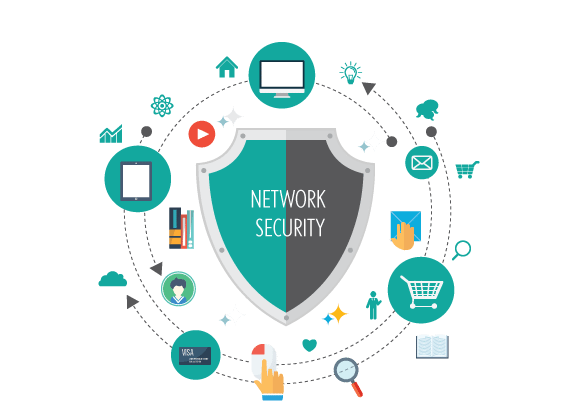Network security tools must be the backbone of business security in the UK since any company that uses the Internet to provide services or offer products must be concerned about the stability of its technological infrastructure.
And now, after the pandemic and the importance that teleworking has taken on, companies that keep their assets in digital format to facilitate their production processes also need to guarantee data security.
That’s where infrastructure monitoring tools, servers, and networks, in general, take center stage. Keep reading!
Table of Contents
ToggleWhat are network security tools and what are they used for?
Let’s start by saying that network monitoring is a technique that allows us to increase our security because it provides the information that the IT areas need to determine its proper functioning and make timely decisions in case of risks.
To do this, network monitoring is supported by tools and software that facilitate the identification of deficiencies and optimizations in an efficient and non-reactive manner.
Today, changes in consumption habits, fluctuations in demand, and distancing force companies to look for truly effective solutions that keep their information safe.
For this reason, now more than ever, network security tools play a fundamental role in guaranteeing the integrity of the information technology (IT) infrastructure.
But few robust solutions guarantee excellent network performance and even fewer pay attention to details regarding servers and applications.
Let’s see which are the most recognized and recommended.

1. Anti-virus software
In any case, all computers connected to the network, personal and corporate, must have a free and reliable antivirus. This type of program allows for effective protection measures against the detection of malware or other malicious elements, by offering the possibility of eliminating possible threats or putting the device in a “quarantine” state.
Within the market, some solutions integrate different functionalities adaptable to the needs of each organization. However, it is important that the one adopted has the pertinent updates so as not to expire in the face of new threats.
2. Network perimeter firewall
It is one of the most recommended network security tools. Its operation is simple: it scans the network packets, allowing or blocking them according to the rules defined by an administrator.
Although its structure is basic compared to the sophistication of the threats, modern firewalls can be found that can classify files using various parameters. Thus, web traffic can be efficiently inspected, users identified, and unauthorized access blocked, among other actions.
3. Proxy server
A proxy is a device or computer program that acts as an intermediary between the connections of the browser and the Internet, filtering all packets between the two. It is classified as one of the good computer security tools because, through it, you can block websites that are considered dangerous or prohibited within the work environment.
On the other hand, it allows you to establish an authentication system, which limits access to the external network, allowing you to have records about sites and visits, among other data.
4. Endpoint encryption or endpoint disk encryption
It is a process of encoding data so that it cannot be read or used by anyone who does not have the correct decryption key. In essence, it protects operating systems from installing corrupted boot files by locking down files stored on computers, servers, and other endpoints.

5. Vulnerability scanner
It is one of the most important network security tools in fundamental computer systems in companies of any size. It consists of software that is responsible for detecting, analyzing, and managing the weak points of the system.
Thanks to this platform, the exposure of business resources to cybersecurity threats and their possible consequences can be kept under control. In addition, it allows alerts in real-time, which helps solve problems on time and without compromising business continuity.
Cybersecurity trends that help mitigate web threats for your business
- Cybersecurity experts: the information you share in cyberspace must be safe and protected on all fronts and from various types of attackers, so you must have cybersecurity professionals and experts who can adapt quickly and flexibly to constant changes in technology and use network security tools to be steps ahead of cybercriminals.
- Security in the cloud: the computing cloud offers services such as servers, storage, databases, networks, software, information analysis, and backup copies through the internet; the amount of information, as well as its value, makes it a target of attack. It is important to develop and deploy a security architecture that keeps the entire IT environment secure, including processes, policies, and the people who use it.
- A strategy for detecting and mitigating a cyber-attack: While taking action to prevent yourself from virtual threats is valuable, a strategy that focuses on detection, response, and remediation will lead to better results for your business.
- Protection of personal data: your company must also take into account its cybersecurity strategies, protecting the data of its clients and partners, as well as that of its collaborators.
- Blockchain for Authentication and Access Functions: Blockchain is a cryptocurrency business, however, it can be used for authentication and access functions, thereby detecting suspicious behavior and insulating the connection to restrict potential threats.
Conclusion
Many are not yet aware of all the cyber-attacks that exist today. Broadly speaking, it is thought that computer security is something that only large companies have to deal with or protect, but for your business, your information is as vital as theirs is for them.
Furthermore, cybercriminals do not care who is affected and who is not. They just drop a computer virus and it sweeps away everything it finds. That is why it is so important that you have good network security tools for your systems.
To build a business culture where prevention and cybersecurity are constant, companies must be able to measure and anticipate the inherent risk to their employees and the team. Today we cannot rely solely on common sense to combat potential attacks. Remember that the key to avoiding this type of attack on your company is to efficiently coordinate technology, users, and processes. Only then can you achieve security strategies that block cyberattack attempts.

